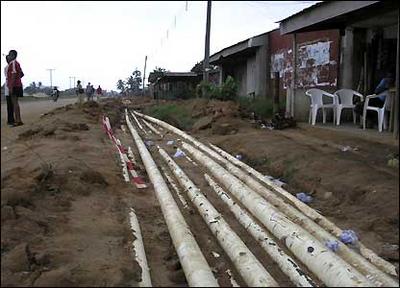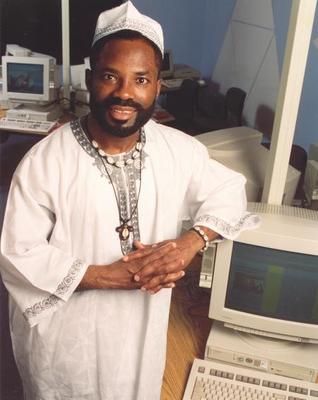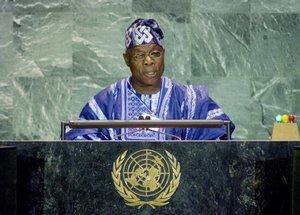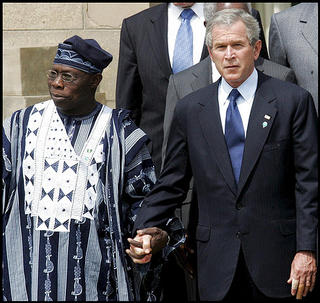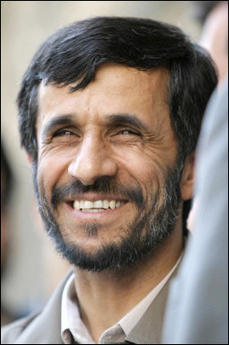
Aug. 30, 2005 - WHEN AMERICA SUFFERS, WHAT DO WE DO?
OUR URGENT APPEAL TO THE REST OF THE WORLD TO COME TO THE AID OF AMERICA IN THE CATASTROPHE OF HURRICANE KATRINA.
Tuesday,August 30,2005.
When the catastrophic Tsunamis struck Indonesia, Sri Lanka and the other countries in the Indian Ocean, America rushed to the rescue of the terrified victims and till date there are more American emergency Aid workers still doing their best to save precious lives and rehabilitate the homeless thousands. But when natural disasters happen in America, the rest of the world will not rush to help Americans in distress. Why? Because, they believe Americans can take care of themselves? But, this is wrong and inhuman. Because, death is no respecter of persons. Scores of people have already died from the collateral damages of Hurricane Katrina and the worst hit millions of people are in Louisiana, Mississippi and Alabama with the death toll of over 55 precious souls who are innocent of the wrath of the earth. Now what are we going to do to help America in her hours of need? Yes, America is now in dire need of our help. And giving helping hands is not always giving money. Words of comfort go a long way to help those who are hurting and languishing as millions of those who have lost their loved ones, homes and very valuable properties worth billions of dollars in Louisiana, Mississippi and Alabama. The thousands of refugees are in the shelter in the New Orleans' Superdome stadium, where power was lost early Monday power supplies, water supplies and businesses have been wrecked. The trauma is nerve-wrecking and millions of people in New Orleans are harrowing in sorrow now. And their sorrow will linger till tomorrow.
Only God who understands why these terrible disasters happen can comfort us. But, what can we do to prevent there earthquakes, tsunamis, tornados, hurricanes, volcanic eruptions and other catastrophic disasters on planet earth? Are our scientific exploits not enough to develop the means to avert these disasters? Have we failed to develop the technologies to build safer homes that can withstand these disasters? Have we ignored the knowledge that God has already given us to overcome all these natural and unnatural disasters of the wrath of the earth and allow ourselves to be living in fear and trembling in the shadow of death?
We have many questions, but very few answers. How can we continue to survive on this planet earth, the only home we have in the whole universe? Or are we going to look for another planet that will be safer for human habitation? Where is such a planet? Only God has the answers to all the questions of the fears of humans on earth.
Of course, the precious lives lost can never be replaced. Human Life is priceless. Who will comfort the bereaved. America is going through trials and tribulations and yet America has the time to come to our rescue in Niger, the Sudan, Ethiopia and other parts of Africa and the rest of the world where there are emergencies. Now let us come to bear with Americans in this their moments of pains and tears of great loss as they suffer the ravages of this catastrophic Hurricane called Katrina.
Hurricane Katrina's wrath still being felt as death toll rises to 55
Holbrook Mohr
Canadian Press
Tuesday, August 30, 2005
Adeline Perkins carries her dog, Princess, as Lynell Batiste carries Timmy while Kewanda Batiste and Ulysses Batiste swim through the flood waters from their Lacombe, La. home. (AP Photo/Mari Darr~Welch)
GULFPORT, Miss. (AP) - U.S. Gulf Coast residents staggered from the body-blow inflicted by hurricane Katrina, with more than a million people without power, lowlands swamped and at least 55 dead - a number likely to increase as rescuers reach the hardest-hit areas.
Boats rescued people clinging to rooftops, hundreds of trees were uprooted and sailboats were flung about like toys after Katrina crashed ashore Monday in what could become the most expensive storm in U.S. history.
The U.S. federal government began rushing baby formula, communications equipment, generators, water and ice into hard-hit areas of Louisiana, Mississippi and Alabama, along with doctors, nurses and first-aid supplies.
The U.S. Defense Department sent experts to help with search-rescue operations.
The death toll jumped late Monday when Harrison County emergency operations center spokesman Jim Pollard said an estimated 50 people had died in the county, with some 30 dead at a beach-side apartment complex in Biloxi.
"This is our tsunami," Biloxi Mayor A.J. Holloway told the Biloxi Sun Herald.
Mississippi Emergency Management Agency officials refused to confirm the deaths. Three other people were killed by falling trees elsewhere in Mississippi and two died in a traffic accident in Alabama, authorities said.
The total does not include 11 deaths in South Florida when a much-weaker Katrina first made landfall last week.
Katrina knocked out power to more than a million people from Louisiana to the lorida Panhandle - the westernmost areas of the southern state - and authorities said it could be two months before electricity is restored to everyone. Ten major hospitals in New Orleans were running on emergency backup power.
"It will be unsafe to return to the coastal area for several days," Mississippi Gov. Haley Barbour told evacuees Monday. "Be patient. Don't be in a hurry to go back."
According to preliminary assessments by AIR Worldwide Corp., a risk modeling firm, the property and casualty insurance industry faces as much as $26 billion US in claims from Katrina.
That would make Katrina more expensive than the previous record-setting storm, Hurricane Andrew, which caused some US$21 billion in insured losses in 1992 to property in Florida and along the Gulf Coast.
Mississippi's economy was also dealt a blow that could run into the millions, as the storm shuttered the flashy casinos that dot its coast. The gambling houses are built on barges anchored just off the beach, and Barbour said emergency officials had received reports of water reaching the third floors of some casinos.
After striking the Gulf Coast as a Category 4 hurricane, Katrina was later downgraded to a tropical storm as it passed through eastern Mississippi, moving north at nearly 35 km/h. Winds early Tuesday were still nearly 100 km/h.
At New Orleans' Superdome stadium, where power was lost early Monday, some 9,000 refugees spent a second night in the dark bleachers. With the air conditioning off, the carpets were soggy, the bricks were slick with humidity and anxiety was rising.
"Everybody wants to go see their house. We want to know what's happened to us. It's hot, it's miserable and, on top of that, you're worried about your house," said Rosetta Junne, 37.
Associated Press reporters Mary Foster, Allen G. Breed, Brett Martel, Adam Nossiter and Jay Reeves contributed to this report.
-
On the Net:
National Hurricane Center:
Http://www.nhc.noaa.gov




